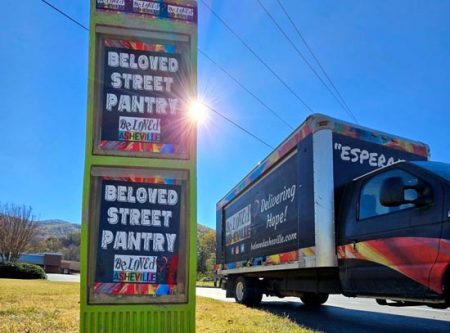EPA Awards ‘Brownfield Assessment’ to Mt. Zion
 |
| This picture captures (in part) the parcel of land owned by Mt. Zion Community Development Corporation designated in the Brownfield assessment. Photo: Urban News |
Staff reports
Cleanup will support mixed-use redevelopment.
Mt. Zion Missionary Baptist Church of Asheville will reap big dividends from the Environmental Protection Agency’s decision to approve Mt. Zion’s application for a comprehensive brownfield assessment and cleanup, and to assign a national environmental remediation firm, Tetra Tech, Inc., to begin work on a two-acre distressed parcel in The Block, the historic commercial center of Asheville’s African American community. Studies of the parcel, the former site of a foundry, done in the 1990s indicated evidence of underground storage tanks and other residue from industrial operations.
The June 30 announcement by EPA’s Region 4 staff in Atlanta was seen as a major advance in federal leadership on environmental justice issues. Environmental justice is one of many social equity issues adding color to national discussions within the sustainability and Smart Growth movements, yet brownfields in African American communities were not included in a July 2009 brownfield workshop held in Asheville, nor during an official brownfields tour arranged by local and regional governments for federal visitors in February 2010.
Mt. Zion’s direct engagement of the EPA began when BluEcon Project
Management led EPA to tour brownfields in Asheville’s African American
community. BluEcon Project Management specializes in managing green
economy projects during economic downturns and advocates for public
adoption of transparent benchmarks for sustainability and livability,
and federal leadership and support of innovative projects that advance
sustainability goals.
The leadership of Mt. Zion Missionary Baptist Church and its
community development nonprofit, Mt. Zion Redevelopment Corporation,
envision reusing the brownfield’s open spaces as spiritual and
sculptural gardens and for LEED-certified renovation of the vacant
industrial masonry structures into affordable residential rental lofts. A
wellness facility is also included in the Mt. Zion Neighborhood Master
Plan.
“From the moment we gave EPA their first tour of The Block’s two
brownfields, they’ve been enthusiastic,” said Gregory Sills, founder of
BluEcon Project Management. “Before reaching EPA, we had been told in
February at a meeting attended by city, regional and state brownfield
staff, that if underground storage tanks are involved in projects in
that part of Asheville, then a fresh Phase I assessment must be paid for
and completed by the developer before remediation services can be
funded locally.”
“That hurdle was OK for our other client in The Block because
they had already paid for a Phase 1,” Sills explained. “But for the
larger Mt. Zion cleanup site, we had to turn directly to EPA in Atlanta.
Their brownfield staff informed us of our options given the tight
budget of the Mt. Zion project and knowing that the parcel’s prior Phase
I was out-dated.”
The Mt. Zion brownfield remediation effort gives a major federal
agency an opportunity for direct contact with Asheville’s African
American institutions and to hear the community express its unique
perspectives in their own voices. At the same time, EPA will have
front-row seats for many months in 2010 and 2011 while exploring how
environmental justice, along with urban demolition and renewal, were
played out in Asheville in the historic East End and South Side
communities. Interested agency researchers will have time to explore
connections between the legacy of demolition that created South
Charlotte Street, the current lack of services, and related conditions
in communities linked to The Block’s history.
Perspectives of Asheville as seen through The Block may be added
to national discussions on who is and is not included when funding
opportunities for sustainability projects arise. The legacy of past
decisions and choices weigh heavily in North Carolina communities
striving to improve their livability and sustainability. EPA has
designated Camilla Warren, EPA Brownfields Project Manager in Atlanta as
the project manager for the Mt. Zion Targeted Brownfield Assessment.
For more information, contact Gregory Sills, BluEcon Project Management at (828) 707-3528 or [email protected].








